There has been no increase in the number of complaints of crimes against children during the coronavirus-induced lockdown in the country, National Commission for Protection of Child Rights chairperson Priyank Kanoongo said.
In fact, the NCPCR, the country's apex child rights' body, reported to authorities some reports claiming otherwise, he said.
Speaking to PTI, Kanoongo also said the NCPCR took various steps to address the challenges faced by children due to the coronavirus pandemic and the subsequent lockdown.
Asked if the number of complaints related to crimes against children saw a rise during the lockdown, which began on March 25, he said "no".
"In fact, we reported to authorities a few reports that claimed that there has been a rise during this period," he added.
On concerns that there maybe a rise in the dropout rate for schoolchildren due to the pandemic, Kanoongo said having such apprehension even before the schools reopen is "not correct".
More From This Section
"It will be unfair to challenge the wisdom of children. Children fulfil their national duty by going to school and studying. Children, even in difficult circumstances, are attending schools, so we should not have a negative approach towards them," he said.
Kanoongo said the NCPCR asked states to ensure shelters for children when labour migration began in the country in March, and also took up complaints regarding online education with them.
"The children were supplied with ration and milk and we ensured that rights of the children are not affected in any way," he said.
"Secondly, we received several complaints related to online education. We also took up this matter with all state governments. How issues related to fees must be addressed, we also took that up with the state governments," he said.
On the issue of child trafficking during the lockdown, Kanoongo said the commission is moving from a child-centric approach to a family-centric approach.
"Till now, the NCPCR had a child-centric approach to deal with cases of trafficking. But now, from a child-centric approach, we are moving towards a family-centric approach. We spoke to all state commissions on this matter," he said.
"One point is very clear, the main reason for trafficking is poverty so it is essential to undertake preventive measures at the source from where a child is trafficked. Vulnerable children and their families can be mapped and they can then be linked to different social schemes for which we have prepared a strategy and shared it with states," he said.
The NCPCR chief said the child rights' body revamped procedures to address the issues faced by street children due to the pandemic.
"The worst sufferer of poverty is a child so we need a plan to rehabilitate these children. We need to remember that a family is a unit and the first protection mechanism a child gets is from his family. So we must ensure that in the best interest of the child the whole family is rehabilitated.
"We must strengthen the family to ensure the safety and security of children. We need a family-centric approach," he said.
)